Abdominal Plasty or Abdominoplasty
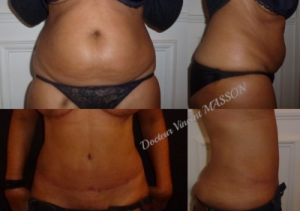
In the context of cosmetic surgery and repair surgery on a damaged abdomen, several cases meet. From isolated liposuction to abdominal plasty or even abdominal miniplasty, whether covered by health insurance or not.
The different terms are synonymous: abdominoplasty or abdominal dermolipectomy. They mean the same thing.
Tummy tuck price
From 4,500 euros in the event of reimbursement by health insurance and 7,500 euros without reimbursement. The price of the tummy tuck depends on the procedure to be performed (liposuction, diastasis cure, high superior tension technique, etc.).
What is the purpose of this abdominal surgery?
The goal is to find a flat, harmonious abdomen, without excess skin or excess fat, and without stretch marks. The surgery acts on three different components, associated or not as needed: the skin (re-tensioning), the fat (removed) and the muscles (tightened).
Who is the abdominoplasty intended for?
- Patients with stretched, wrinkled and excess skin on the abdomen.
- Global or localized excess fat.
- Multiple stretch marks.
- Abdominal apron (the skin of the belly falls on the pubis, tending to cover it partially or completely).
- A complex about clothing.
- Multiple pregnancies.
- Massive weight loss (stomach surgery or not).
- Cesarean scar or multiple scars.
- Diastasis (gap between the muscles of the abdomen following pregnancy).
- Umbilical hernia.
What are the different possible operations?
In the event of localized and not too significant fat deposits with a good quality facing skin without significant excess, only liposuction is carried out. Microincisions (1 to 3 mm) are made and with the help of soft cannulas, the suction of excess fat is carried out. This technique avoids scarring but cannot always guarantee it.
In case of excess skin, simply removing fat will not be enough and you must also remove excess skin. If the excess of skin is small, an abdominal miniplasty will be performed, the scar is short and hidden in the underwear at the pubis like a horizontal cesarean scar. If the excess skin is significant, we will then perform a classic abdominoplasty with a scar hidden in the underwear area but longer and a second, very discreet, scar hidden in the navel (umbilical transposition) which will be reshaped in a more harmonious way, adapted to the new flat stomach.
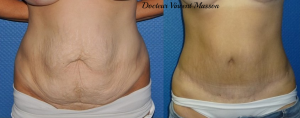
Are there any contraindications?
Yes, beware of the following: very overweight, unbalanced diabetes, active chronic smoking, medical history of phlebitis and pulmonary embolism, multiple bowel surgeries. To avoid complications a diet will be prescribed before surgery for being overweight, diabetes will be balanced and smoking stopped.
Is social security coverage possible?
In some cases yes. Social security can cover part of the costs. The number of pregnancies or children is no longer a criteria, the only thing that counts is the presence of an abdominal apron covering the pubis. If the belly skin covers the pubis, after prior agreement with social security, part of the costs of the operation will be covered. All other cases are cosmetic surgery. The prior agreement is made by your plastic surgeon.
What happens before the operation?
A consultation with your surgeon is essential. After examining you (medical history, venous condition, weight, hernia, diastasis, skin quality, excess fat, scars, etc.), Doctor Masson will explain the best technique suited to your case (liposuction, abdominal miniplasty or abdominal plasty). Liposuction is almost always associated. A prior agreement with social security may be made by your surgeon. Sometimes the operation will be contraindicated or strongly discouraged. You will be given an information sheet as well as a biological assessment and possibly a scan or an ultrasound to perform in the event of a hernia or distasis. After a reflection period which is compulsory, a second consultation will be carried out and an operating date may then be set. Compression stockings to avoid phlebitis and an abdominal compression garment will be prescribed. Tobacco use must absolutely be stopped for this operation (minimum one month before). Likewise, aspirin should be stopped a week before the procedure.
What is the anesthesia used and what is the duration of hospitalization and the operation?
Anesthesia is general. An anesthesiologist should be seen at least 48 hours before the procedure. The operation lasts between 1h and 2h30 depending on the case (amount of skin to be removed, diastasis, excess fat to be aspirated). The duration of hospitalization is 24 to 72 hours. With modern surgical techniques, the length of hospital stay has decreased from 3 to 7 days.
Modern surgical technique
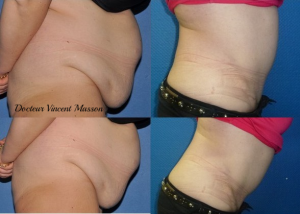
The liposuction technique is gentle and atraumatic and follows the classic rules described in the specific section on liposuction. The procedure almost always begins with liposuction in order to remove excess fat. The technique of abdominal plasty used by Doctor Masson is a recent technique which gives better results, is stable over time and has simpler, less painful and lengthy surgical procedures. This is the high superior tension technique. Several variants exist and Doctor Masson will use the technique best adapted to your morphology.
The scar is horizontal and hidden in the underwear area. It is more or less long (miniplasty or not) depending on the skin to be removed. All the skin of the abdomen is removed in a plane respecting the lymphatics. The skin is then stretched down and sutured meticulously with absorbable threads. Points are placed on the inside, under the skin, and around the navel to reduce detachment and avoid significant traction on the scar (high tension technique). Most often, all of the skin between the pubis and the top of the navel is removed. An incision is made at the level of the navel in order to bring it to the right level and to give it a more youthful shape. It is often too large and its size is reduced. The pubis is automatically raised by the tummy tuck.
In some cases, the abdominal muscles (rectus) are distended by pregnancy and too wide apart. This is called a diastasis. It is visible lying when the legs are raised from the bed. A curvature in the middle of the belly is created. This diastasis must be corrected during the intervention when it exists (a diastasis cure). Stitches are placed at the sheaths surrounding the muscle in order to tighten the abdominal wall and to reconstitute the abdominals.
Is a tummy tuck associated with liposuction?
Almost systematically yes, from the moment there is too much fat on the belly.
What are the postoperative effects?
As soon as you return home, you must plan:
- Dressings to be made daily by yourself or a nurse for 7 to 15 days
- A daily injection of Lovenox for 10 days (by a nurse or yourself) to avoid phlebitis
- Compression stocking worn for 7 days
- Wearing a compression garment day and night for 4 to 6 weeks
- Shower every day as usual (without the compression garment)
- No sport for six weeks
- Time off work of 7 to 30 days necessary depending on the profession.
- The sutures fall out by themselves.
- Do not carry heavy loads for 2 weeks
Does it hurt?
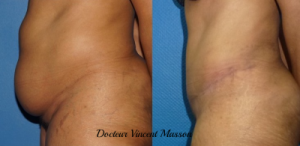
The procedure is more or less painful depending on the individual, the amount of skin removed, the fat extracted and whether or not there is a distasis. The compression garment helps limit movement and, therefore, pain. Analgesics will be prescribed in all cases to limit the discomfort (usually 5 to 15 days).
Is there an age limit?
Dependent on the law, no.
The abdominoplasty scar
The scar is more or less extended depending on the excess skin. It can be located only at the pubis as part of mini-abdominal plasties or extended to the sides in larger types. In all cases it is hidden in the underwear area. After an initial phase of redness for 3 months which is normal, the scar will gradually whiten then fade after 12 to 18 months to represent only a small fine line.
It is imperative to protect the scar from the sun during the first year.
Is the sagging pubic area corrected?
Yes, tightening the belly skin also tightens the pubic skin.
When is the result visible?
Almost immediately after the procedure. However, there is a significant amount of swelling and scar retraction after the operation. The final result can only be judged and final after one year of evolution.
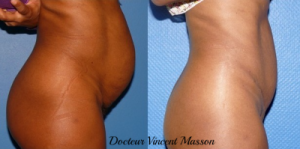
What are the potential complications ?
If the indication is good and the terrain favorable, the operation is generally simple and complications rare. However, they do exist and deserve to be cited:
- Phlebitis and pulmonary embolism (prevented by compression stockings and lovenox injections).
- Hematoma, seroma (blood clots or lymph effusions), which may require reoperation.
- Skin infection and necrosis (prevented by stopping smoking before the operation).
- Altered sensitivity (the skin of the abdomen is hard, lacking in sensitivity). It is not a real complication however because it is almost always systematic and resolves itself spontaneously in 3 to 12 months.
- Pathological scar according to skin quality (hypertrophic or keloid).
- Resulting local imperfections (residual excess fat or skin, irregularities, scar asymmetry): a small touch-up under local anesthesia can often be considered.


